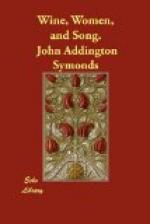Occasionally the lover’s desire touches a higher point of spirituality:[22]—
“Non tactu sanabor labiorum,
Nisi cor unum fiat duorum
Et idem velle. Vale,
flos florum!”
Occasionally, the sensuous fervour assumes a passionate intensity:[23]—
“Nocte cum ea si dormiero,
Si sua labra semel suxero,
Mortem subire, placenter obire,
vitamque finire,
Libens potero.”
Very rarely there is a strong desire expressed for fidelity, as in a beautiful lyric of absence, which I hope to give translated in full in my 17th Section.
But the end to be attained is always such as is summed up in these brief words placed upon a girl’s lips:[24]—
“Dulcissime,
Totam tibi subdo me.”
And the motto of both sexes is this:[25]—
“Quicquid agant alii,
Juvenes amemus.”
It may be added, in conclusion, that the sweethearts of our students seem to have been mostly girls of the working and rustic classes, sometimes women of bad fame, rarely married women. In no case that has come beneath my notice is there any hint that one of them aspired to such amours with noble ladies as distinguished the Troubadours. A democratic tone, a tone of the proletariate, is rather strangely blent with the display of learning, and with the more than common literary skill apparent in their work.
FOOTNOTES:
[Footnote 15: Carm. Bur., p. 174.]
[Footnote 16: Ibid., p. 149, translated below in Section xvii.]
[Footnote 17: Ibid., p. 130.]
[Footnote 18: Carm. Bur., p. 200.]
[Footnote 19: Ibid., p. 231.]
[Footnote 20: Ibid., p. 121.]
[Footnote 21: Ibid., p. 135.]
[Footnote 22: Carm. Bur., p. 145.]
[Footnote 23: Ibid., p. 230.]
XI.
The drinking-songs are equally spontaneous and fresh. Anacreon pales before the brilliancy of the Archipoeta when wine is in his veins, and the fountain of the Bacchic chant swells with gushes of strongly emphasised bold double rhymes, each throbbing like a man’s firm stroke upon the strings of lyres. A fine audacity breathes through the praises of the wine-god, sometimes rising to lyric rapture, sometimes sinking to parody and innuendo, but always carrying the bard on rolling wheels along the paths of song. The reality of the inspiration is indubitable. These Bacchanalian choruses have been indited in the tavern, with a crowd of topers round the poet, with the rattle of the dice-box ringing in his ears, and with the facile maidens of his volatile amours draining the wine-cup at his elbow.
Wine is celebrated as the source of pleasure in social life, provocative of love, parent of poetry:[26]—
“Bacchus forte superans
Pectora virorum
In amorem concitat
Animos eorum.




